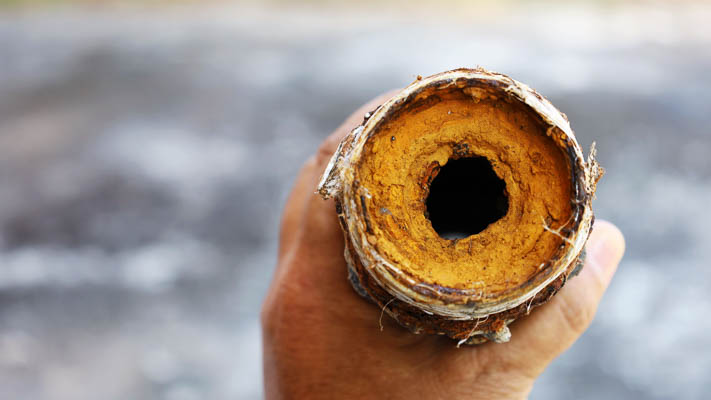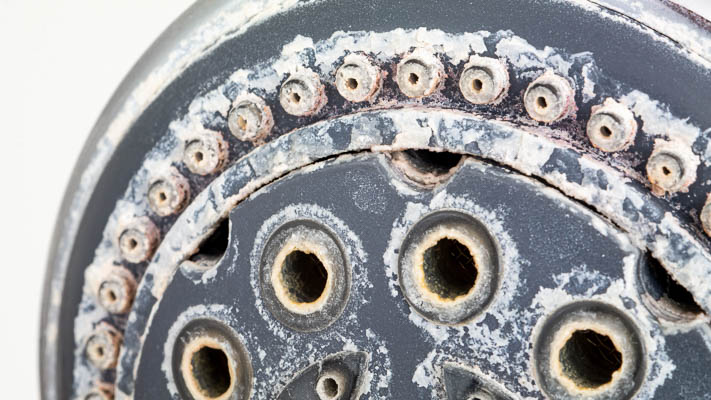Low water pressure in the house can be annoying and troublesome, especially when it's due to a hidden issue like mineral deposits in your plumbing system. Gradually, mineral deposits can build up inside plumbing lines, connectors, and water outlets, resulting in obstructions and diminished flow. This comprehensive guide will explore the reasons behind mineral accumulation, how it restricts water pressure, and the most effective methods to resolve and avoid it.
Ways Mineral Deposits Can Reduce Water Pressure
Mineral buildup in your Atlanta plumbing system can significantly reduce water pressure and result in further plumbing complications. As water travels through your plumbing pipes, elements like calcium, magnesium, and iron can accumulate on the inside surfaces of your pipes. With prolonged use, these mineral layers grow and form thick layers of scale, reducing the pipe’s width and forming uneven pipe walls that hold onto waste materials.
The narrowing increases resistance to water flow, causing:
- Diminished Water Pressure: Narrower pipes and blocked fixtures result in less water reaching your sinks and devices.
- Obstructed Fixtures: Taps and showerheads, which feature tight openings, can easily get blocked by calcium deposits.
- Damaged Appliances: Water-using appliances such as dishwashers, washers, and heaters are especially prone to mineral deposits, diminishing their operational effectiveness and overall durability.
If left unchecked, the accumulation of minerals can result in pipe rusting, leaks, and eventual failure.
What Causes Mineral Buildup in Atlanta Water Pipes?
Multiple causes lead to the formation of mineral buildup in residential plumbing:
- Hard Water: The primary cause behind mineral buildup is water rich in dissolved minerals, which contains high levels of dissolved minerals like key minerals such as calcium and magnesium. As mineral-rich water travels in your pipes, it creates mineral deposits that accumulate over time. Hard water is common in numerous regions, making buildup of minerals a common problem for homeowners.
- Galvanized Pipes: Older properties in Atlanta may have galvanized steel pipes, which are especially prone to scale accumulation. As the zinc coating inside these pipes wears away, the bare iron or steel undergoes a reaction with water and atmospheric oxygen, causing rust and corrosion. This process leads to buildup inside the pipes, which not only reduces water pressure but also weakens the pipe structure.

- Copper Pipes: While copper pipes are a long-lasting choice, they can also experience mineral buildup. When water with high pH levels reacts with copper, mineral particles can cling to the interior pipe lining. The multiple joints and turns in copper piping can make this issue worse, leading to clogs and even tiny leaks.
- Water Chemistry: The distinct makeup of your tap water can also affect the rate of mineral buildup. Excess iron or manganese content, common in certain regions, can lead to iron- or manganese-based residues in your plumbing.
Indicators of mineral accumulation within your pipes
Should you notice the following signs, hard water deposits may be to blame:
- Decreased water pressure: Evident in baths, faucets, and other water outlets.
- Blocked fixtures: Overhead showers and water tap filters may be covered in hard or chalky deposits.
- Rust-Colored Water: Suggesting pipe rusting, often connected to old galvanized plumbing.
- Delayed filling of appliances: Dishwashers and washing machines take longer to fill, indicating reduced water flow.
- Frequent Repairs: Persistent issues with blockages or issues in your plumbing.
How to Fix Mineral Buildup in Atlanta Water Pipes

Once mineral buildup has formed in your water pipes, completely removing it is nearly impossible. These are some ways to address and prevent the problem:
- Install a Water Softener: A water treatment system remedies hard water by swapping out calcium and magnesium with alternative ions like sodium or potassium, significantly reducing mineral deposits. Although this prevents future accumulation, it cannot eliminate current scale from the interior of your pipes.
- Use a Whole-Home Filtration System: Filtration systems can enhance the quality of water by eliminating impurities and excess minerals. These filters are particularly effective in regions prone to iron or manganese buildup.
- Replace Affected Pipes: If scale has extensively damaged your plumbing, the best option is to replace the pipes. Replacing individual pipe sections may resolve localized problems, but a complete pipe overhaul is a better and longer-term fix.
Why Go With PEX Tubing for Repiping?
If you’re upgrading your home’s plumbing, PEX piping is an excellent choice for preventing future mineral buildup. Here’s why:
- Non-porous interior: Cross-linked polyethylene pipes discourage mineral deposits from clinging to the interior, lowering the chances of scaling.
- Fewer joints and connections: PEX allows for continuous installation, cutting down on connections and bends where scaling is more likely.
- Anti-corrosion properties: In contrast to copper and galvanized piping, PEX is resistant to chemical reactions with water minerals.
- Flexibility and Durability: PEX can withstand temperature changes and changes in pressure, providing extended durability.
Installing PEX tubes can improve the water pressure in your house and ensure a dependable plumbing network for years to come.
Preventing Mineral Buildup in Atlanta
Preventative measures can reduce the risk of the costly consequences of hard water deposits:
- Analyze your water for quality: Frequently check for hardness in your water and mineral content, especially if you are located in places with highly mineralized water.
- Add a water softener: Shield your piping system by reducing the mineral content of your water supply.
- Perform a water heater flush: Regular maintenance avoids sediment buildup from building up in the tank, which can decrease performance and result in scale buildup.
- Have your plumbing system inspected: Periodic inspections by a licensed plumber can detect the first signs of buildup or corrosion.
Details regarding Repipe Specialists in Atlanta
If mineral deposits have led to severe issues to your household pipes, Repipe Specialists can provide solutions. With a track record of completing more than 75,000 repipes across the country, they’re specialists in improving water flow and guaranteeing durable plumbing systems.
Why Choose Repipe Specialists?
- Skilled Whole-Home Repiping Services: Install a completely new plumbing system with long-lasting, advanced materials like PEX or copper.
- Fast and Efficient Service: Nearly all installations are completed in just 1-2 days, keeping household interruptions to a minimum.
- Cost-Effective and Clear Pricing: Fair and attractive costs and flexible financing solutions ensure repiping is affordable for every homeowner.
- Lifetime Warranty: Gain assurance knowing your new plumbing system is protected with a lifetime warranty.
Reach out to Repipe Specialists Now
When you notice low water pressure caused by mineral buildup, act before it worsens. Contact Repipe Specialists in Atlanta to arrange a no-cost consultation and specialized recommendations on replacing the pipes in your home. Improve your water pressure and protect your plumbing with a trusted team focused on offering excellent services.
CONTACT US 24/7
Contact us by phone or email with any questions, or to schedule a no-obligation in-home (or remote) consultation with one of our Estimators.
By Phone
Call (404) 474-4045 to schedule an estimate. If you reach our answering service, please leave a message: we return calls in the order they are received.
By Email
Messages sent using the form on this site, go directly to our email, which we check regularly.
Company & License Information
Repipe Specialists - USA